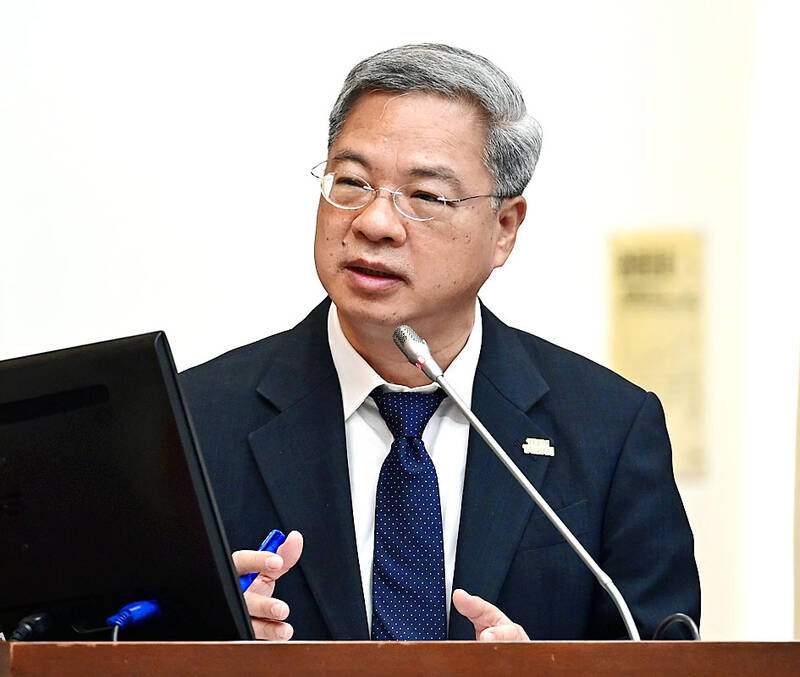There would be no 50-50 split in chip production between Taiwan and the US, Minister of Economic Affairs Kung Ming-hsin (龔明鑫) said yesterday ahead of a legislative meeting in Taipei, responding to comments by officials in Washington.
US Secretary of Commerce Howard Lutnick late last month proposed a “50-50 split” in semiconductor manufacturing, with half of chips used in the US to be made domestically, a plan that Vice Premier Cheng Li-chiun (鄭麗君), who is leading tariff talks with Washington, last week said would not happen.
Taiwan Semiconductor Manufacturing Co (TSMC, 台積電) is investing US$165 billion in six advanced wafer fabs in the US, but building 10 in Taiwan, with more planned, making a 50-50 production split impossible, Kung said.

Photo: Wang Yi-sung, Taipei Times
The outcome of Taiwan-US trade negotiations would be better than a 50-50 split deal, he added.
While the US government might have semiconductor development expectations, TSMC remains in the lead in US investments, where it holds sole ownership, Kung said.
Although TSMC also has investments in Japan and Germany, the company’s most advanced process technologies and the bulk of its production would remain in Taiwan, he said.
“Taiwan’s fabs would still be the most profitable,” he added.
Regarding TSMC and other overseas investments of semiconductor companies, Kung said that the government’s attitude is that if there are orders and profits overseas, no concerns about national security and it benefits the industry, then the government would provide administrative assistance.
The government could provide support such as living and transportation assistance if companies form industrial clusters overseas, while in places like Japan, the government would also help negotiate tax breaks or other benefits with local authorities, he said.
As for investment at home, companies have pledged nearly NT$3 trillion (US$98.25 billion) in combined investment in the government’s three major “Invest in Taiwan” programs and the figure is expected to rise, Kung said.
The Executive Yuan in July approved an extension of the programs to 2027, while boosting the loan limit to NT$720 billion from NT$360 billion.

Shares in Taiwan closed at a new high yesterday, the first trading day of the new year, as contract chipmaker Taiwan Semiconductor Manufacturing Co (TSMC, 台積電) continued to break records amid an artificial intelligence (AI) boom, dealers said. The TAIEX closed up 386.21 points, or 1.33 percent, at 29,349.81, with turnover totaling NT$648.844 billion (US$20.65 billion). “Judging from a stronger Taiwan dollar against the US dollar, I think foreign institutional investors returned from the holidays and brought funds into the local market,” Concord Securities Co (康和證券) analyst Kerry Huang (黃志祺) said. “Foreign investors just rebuilt their positions with TSMC as their top target,

REVENUE PERFORMANCE: Cloud and network products, and electronic components saw strong increases, while smart consumer electronics and computing products fell Hon Hai Precision Industry Co (鴻海精密) yesterday posted 26.51 percent quarterly growth in revenue for last quarter to NT$2.6 trillion (US$82.44 billion), the strongest on record for the period and above expectations, but the company forecast a slight revenue dip this quarter due to seasonal factors. On an annual basis, revenue last quarter grew 22.07 percent, the company said. Analysts on average estimated about NT$2.4 trillion increase. Hon Hai, which assembles servers for Nvidia Corp and iPhones for Apple Inc, is expanding its capacity in the US, adding artificial intelligence (AI) server production in Wisconsin and Texas, where it operates established campuses. This

H200 CHIPS: A source said that Nvidia has asked the Taiwanese company to begin production of additional chips and work is expected to start in the second quarter Nvidia Corp is scrambling to meet demand for its H200 artificial intelligence (AI) chips from Chinese technology companies and has approached contract manufacturer Taiwan Semiconductor Manufacturing Co (TSMC, 台積電) to ramp up production, sources said. Chinese technology companies have placed orders for more than 2 million H200 chips for this year, while Nvidia holds just 700,000 units in stock, two of the people said. The exact additional volume Nvidia intends to order from TSMC remains unclear, they said. A third source said that Nvidia has asked TSMC to begin production of the additional chips and work is expected to start in the second

US President Donald Trump on Friday blocked US photonics firm HieFo Corp’s US$3 million acquisition of assets in New Jersey-based aerospace and defense specialist Emcore Corp, citing national security and China-related concerns. In an order released by the White House, Trump said HieFo was “controlled by a citizen of the People’s Republic of China” and that its 2024 acquisition of Emcore’s businesses led the US president to believe that it might “take action that threatens to impair the national security of the United States.” The order did not name the person or detail Trump’s concerns. “The Transaction is hereby prohibited,”